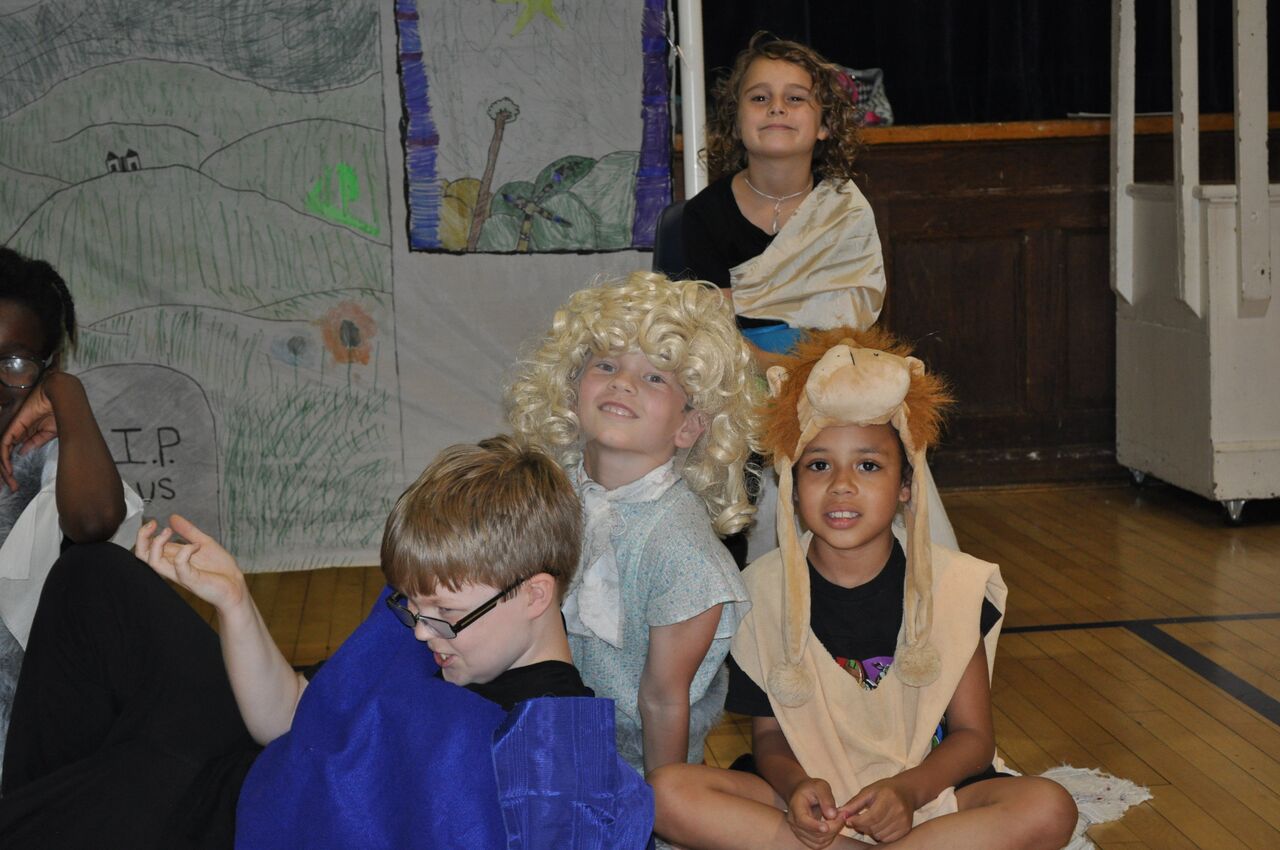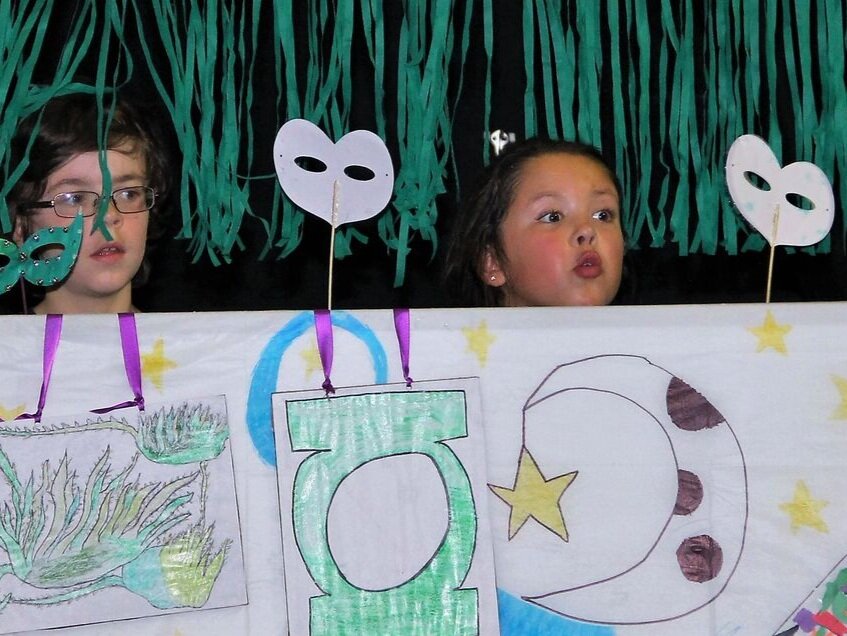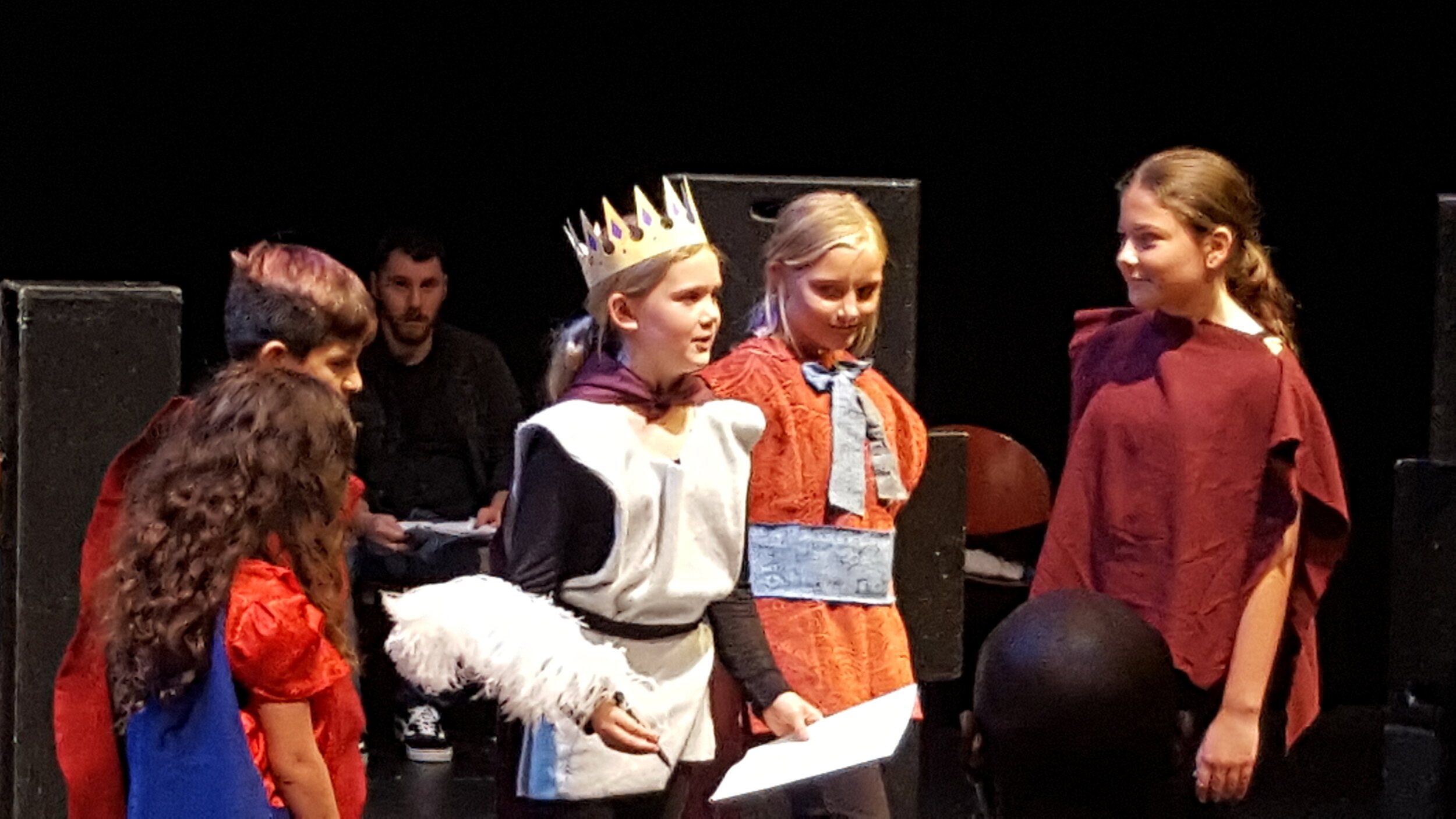New Haven Players Camp
Registration is OPEN!
Session 1: Westville
Congregation Beth El-Keser Israel
85 Harrison St, New Haven
July 8-19, 2024
Tuition: $635
Session 2: Westville
Congregation Beth El-Keser Israel
85 Harrison St, New Haven
July 22- Aug 2, 2024
Tuition: $635
Session 3: East Rock
Edgerton Park
with performance on the Arden Outdoor Stage
70 Cliff Street, New Haven
August 3 - 16, 2024
Tuition: $635
The Fun is Back
Jump into Shakespeare's magical world… campers spend 2 weeks immersed in a supportive and fun environment with classes in acting, stage combat, voice, movement, and theatrical design – all while rehearsing a
30-minute version of a Shakespeare play.
Campers become their own Theatre Troupe, creating costumes, props, and backdrops to create a kid-driven final performance for friends and family on the last day of camp.
A Typical Day:
For the first half-hour, from 9-9:30 am, the whole group meets together to do a warm-up. Then the group divides up into smaller groups for three Morning Classes. After lunch and a little free time, each group has a rehearsal for their final performance. The Morning Classes are Voice & Movement– which helps each actor to learn to use their voice and body to tell the story of their character; Discovering Shakespeare– focused on exploring the words of Shakespeare, how he used his language, and acting skills; and Production & Design– in which campers design and create their own props, scenery, and costumes.
What Age is right for Players?
Children ages 7 years old (rising 3rd grader)
through 13 years old (rising 8th grader). Campers must be the appropriate age at the start of the camp session.
For older students, please consider Teen Camp
for ages 13 through 17 (rising 8th graders to rising Seniors), or the more intensive Summer Scholars Internship Program for ages 14-19 (rising 9th graders through recent HS graduates).
We leave it to parents' discretion to decide whether a 13-year-old will most benefit from being the oldest camper or youngest camper in a group.
Our Teaching Artists
Our teaching artists are working actors, stage managers, directors, and designers. Most have extensive teaching experience in other camps and programs. About a third have postgraduate degrees in theater. All our teaching artists attend our classroom management and curriculum training sessions. At least one per site is certified in First Aid and CPR. We do criminal background checks on all teaching staff. We are very proud of the quality of our teaching artists and curriculum.
There’s a 6:1 teacher/student ratio. The maximum number of campers at each session is 40. For a full camp, there will be 3 teaching artists and 1 manager. Camps frequently also have a teen intern. Each group has no more than 12 campers with one teaching artist, to ensure that everyone gets plenty of individual attention including a guaranteed speaking role in the final production.
The Final Performance!
Each camp ends with a 30-minute performance by each group of 12 campers. Each group will have created its own production of a Shakespeare play, using the original words and poetry (just cut down for time!). Using a DIY (do-it-yourself) aesthetic, the campers make their own sets, costumes, and props. Parents, friends, and famiy are invited at 2:30 on the final Friday afternoon to enjoy the performance. There is a pot luck ‘cast party’ following the performance to celebrate the campers’ achievement.
Have an older sibling?
Click here to check out Teen Camp for kids 13-18 years old.
+ How long have you been doing Players’ Camps?
After a very successful first year in 2016, and a pandemic online shift for 2020, ESC Players Camp returns for 2024. The format, curriculum and teaching artist training comes directly from San Francisco Shakespeare Festival's nationally recognized curriculum which is now in their 30th season of Shakespeare Camps, and serves over 750 campers every summer in 35 locations.
+ How old should you be to attend Players' Camp?
Children ages 7 years old (rising 3rd grader) through 13 years old (rising 8th grader). Campers must be the appropriate age at the start of the camp session.
For older students, please consider Teen Camp for ages 13 through 17 (rising 8th graders to rising Seniors), or the more intensive Summer Scholars Internship Program for ages 14-19 (rising 9th graders through recent HS graduates).
We leave it to parents' discretion to decide whether a 13-year-old will most benefit from being the oldest camper or youngest camper in a group.
+ Is it okay to go to Players' Camp if you've never acted before?
Yes! ESC Camps are designed for beginning and intermediate campers. Classes are small enough that our teaching artists are able to work with each individual at his or her level, including those who are new to performing.
+ What is the student to teacher ratio at camp?
Approximately 6:1. The maximum number of campers at each session is 40. For a full camp, there will be 3 teaching artists and 1 manager. Full camps frequently also have a teen intern. Each group has no more than 12 campers with one teaching artist, to ensure that everyone gets plenty of individual attention and a speaking role in the final production.
+ Who are the teaching artists at Players' Camp?
Our teaching artists are working actors, stage managers, directors, and designers. Most have extensive teaching experience in other camps and programs. About a third have postgraduate degrees in theater. All our teaching artists attend our classroom management and curriculum training sessions. At least one per site is certified in First Aid and CPR. We do criminal background checks on all teaching staff. We are very proud of the quality of our teaching artists and curriculum.
+ What happens during a typical day?
For the first half-hour, from 9-9:30 am, the whole group meets together to do a warm-up. Then the group divides up into smaller groups for three classes. At the end of the day, each group has a trehearsal for the final performance.
+ What are the morning classes?
In Shakespeare Players camps, the classes are Voice & Movement, which helps each actor to learn to use their voice and body to tell the story of their character; Discovering Shakespeare, focused on exploring the words of Shakespeare, how he used his language and acting skills; and Production & Design, in which campers design and create their own props, scenery, and costumes.
+ What if my child is unhappy with his/her role?
Most campers, even if they are initially unhappy with their casting, find that they love their roles after a day or two of rehearsal. We find that even if cast in a role that has only one scene and a few lines, an actor with a good attitude can make the most of it, and often becomes one of the most memorable actors in the show!
+ How do you cast the camp shows? Does everyone get a part?
During the first day of camp, the teaching artists will describe the characters and action of the play and have campers read aloud from the script. Intermediate campers, who can be heard and understood, stand comfortably on-stage, and seem energized and committed, are likely to be cast in roles with a larger amount of stage time. Beginning campers, who still need to work on the above skills, will probably start with smaller roles. The teaching artist usually decides on the casting that night and distributes parts on Tuesday during rehearsal. Every effort is made to give each child an appropriate role for his or her level of experience and comfort on stage. And yes, everyone gets a speaking role.
+ When is the final performance?
Final performances are at 2:00PM on the final Friday of the camp. Following the performance there will be a cast party with a pot luck buffet provided by parents.
+ What is the disciplinary procedures at camp?
Each camper is asked to sign an agreement before the start of camp saying that he or she will agree to follow our basic camp rules of respect for the teaching artists, respect for the site, and respect for each other. During the first morning warm-up, the teaching artists will go over this agreement and ask campers to give suggestions for positive ways to support each other and the productions. If a camper violates a camp rule, he or she will first receive a warning, then a time-out with the manager, then a parent call from the manager, then a call from the Education Director and expulsion from camp. Major infractions will result in immediate expulsion. We do not tolerate behavior that interferes with other campers' enjoyment of camp.
+ Do you accept students with special needs?
Yes. In the past we have had campers with autism, cerebral palsy, Asperger's syndrome, diabetes, and other mental and physical challenges. We find that most of these campers do extremely well at camp. Those with severe challenges may need the on-site attention of a parent or caregiver - this is decided on a case-by-case basis. We ask that all parents of children with special needs indicate this on the emergency form. The more we know, the more prepared our staff can be.
+ Is it okay to miss days during Shakespeare Camp?
The campers who are able to attend every day of camp undoubtedly have a more rewarding experience. Even a short absence can cause your camper to miss out on a lot! Of course, emergencies and illnesses happen, and we do our best to work with them. Parents and children should remember that putting on a play requires a team effort from all cast members, and absences hurt the production. Please do not plan your vacation to overlap with the camp. There are no discounts for missed days of camp.
+ My child loved camp! Can we sign up for a second session, or will it be too repetitive?
Although the basic curriculum remains the same from session to session and year to year, a different teaching artist may have a different approach, and campers frequently benefit from multiple sessions in one summer. If your child is signing up for multiple sessions, let us know and we'll try to put him or her into a different show or with a different teaching artist so that he or she will have a new experience in each session.
+ How can my child best prepare for camp? Do you recommend any books or videos?
Although it's fine for campers to walk in without having read the plays or seen any Shakespeare, it's always an advantage to have a little prior experience with the language. Look for a reading list for books and videos we suggest for our campers.
+ Do you have scholarships?
Yes. We offer need-based scholarships on a case-by-case basis. Please email Education@ElmShakespeare.org with your needs. We have never had to turn away a camper with genuine financial need, although we may have some restrictions on which camp sessions are available.
































